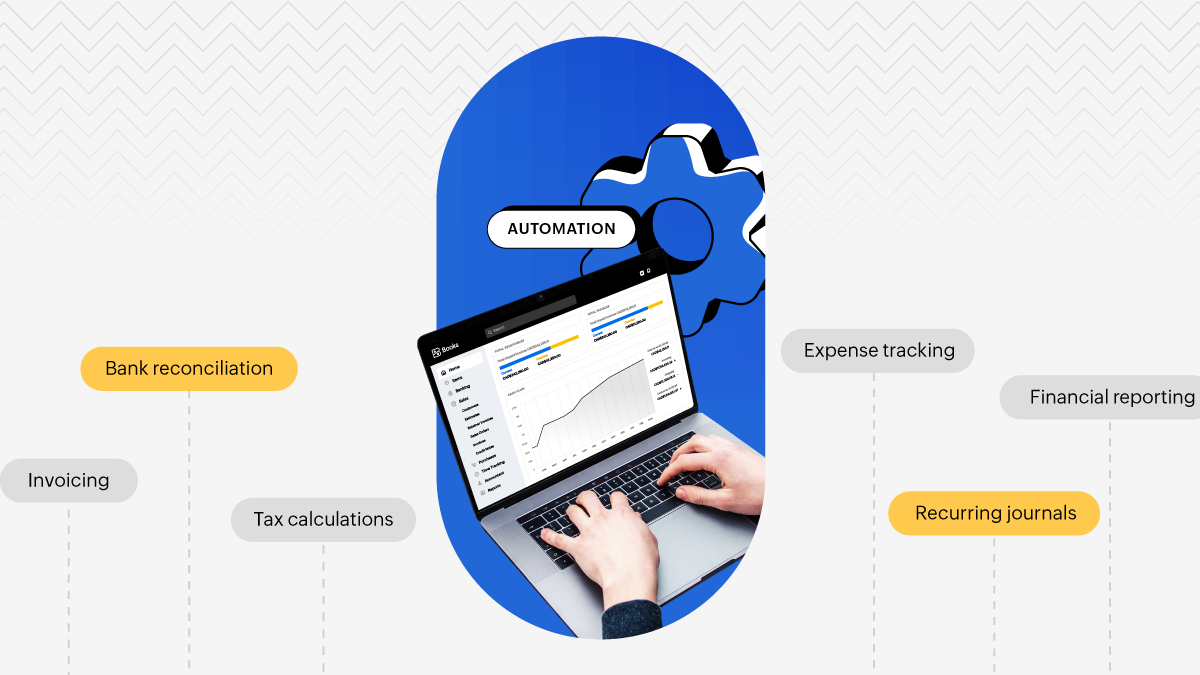- HOME
- Accounting trends & insights
- Top automations to implement in your accounting process
Top automations to implement in your accounting process

Amongst all essential functions for running a business, accounting has been one of the most critical pillars. Over the years, business accounting has undergone a significant digital transformation, shifting away from manual, paper-based processes. More and more companies are moving away from traditional accounting to online accounting. And one of the biggest advantages of online accounting is automation.
Automation helps businesses eliminate repetitive tasks, reduce errors, enhance accuracy, and improve decision-making. This article will delve into what makes automation essential in accounting, including the main benefits and processes that you must automate to make accounting easier for your business.
How automation makes accounting easier?
Accounting by itself involves a huge volume of repetitive tasks like generating invoices, tracking expenses, and reconciling bank statements. All these tasks, when done manually, are not only time consuming, but are also prone to errors.
Automation helps execute these accounting tasks by handling them with minimal human intervention. Be it sending an invoice to a customer every month or reminding them about their payments, automation can do these. This ensures accurate financial records, eliminates room for errors, and saves valuable time for accountants and business owners.
In today's fast-paced world, automating your accounting is not just an option; it's a necessity to elevate your business management.
What are the advantages of automating accounting for your business?
Here are some of the key benefits of automating your business accounting.
Less scope for errors
Manual data entry is error prone and leads to inconsistent financial records. Automation eliminates that by automatically fetching data from different sources and feeding it into your accounting software.
More time savings
Automation speeds up processes like invoice generation, bank reconciliation, report generation, and similar tasks. What once took hours can now be done in a matter of minutes, freeing up your time to focus on other important tasks.
Did you know that Zoho Books customers, on average, save 40–60% of the time that they used to spend on accounting tasks? Check out our customer success stories to hear from them.
Real-time financial data
With automation, your data is always up to date. Your data across systems is always in sync and gives you better financial clarity, landing you in a position where you are empowered to make better business decisions.
You stay compliant
Accounting software can automatically calculate taxes for each transaction, apply real-time currency conversions, and follow local tax laws, ensuring your business data stays compliant. This saves you from potential non-compliance penalties.
Boosts team productivity
All these benefits roll up to increased productivity. Eliminating mundane tasks saves time for you and your team so you can all focus on other critical activities to grow your business.
What are the top automations you must implement in your accounting process?
Here are key accounting tasks where automation can make a significant difference.
Invoicing and payments
If you are doing routine sales with your customers, you can easily set up recurring invoices in your accounting software. Your customers receive the right invoices at a set frequency. You can also set up payment reminders where you can nudge them to make payments on time, helping you maintain a steady cash flow.
Bank reconciliation
With automated bank feeds, data from your banks directly flows into your accounting software. This data is reconciled with the financial transactions recorded in your accounting software. This helps maintain accurate records and flags erroneous transactions. The transactions are also automatically categorized, which gives you a clear view of where money is flowing.
Tax calculations and filing
Taxes are complicated, and they vary from region to region. With accounting software, you can configure tax rules based on your location, product, service, and more. This automatically applies the correct tax rate to your transactions and helps you generate detailed tax reports anytime. Some of the tools also integrate with your government tax portals, enabling direct tax filing.
Expense tracking
With mobile apps, you can scan receipts, and with OCR technology (optical character recognition), data from receipts is automatically fetched and inputted into your system. This helps categorize and track expenses and also saves you and your team from the trouble of managing physical documents.
Recurring journals
Certain accounting transactions like employee wages, rent, and depreciation happen at periodic intervals. You can automate these recurring journal entries so they are recorded automatically without any manual intervention.
Financial reporting
Rather than running reports every week or month, you can schedule them so they are emailed automatically to key stakeholders at set intervals. These can include cash flow summaries to your management, project level updates to your team leads, customer data to relationship managers, and the like. Everyone in the team stays informed about what's happening.
Automation doesn’t replace people in the workforce. It gives them back the hours to focus on strategy, clients, and growth. By letting your accounting software take charge of repetitive tasks, you not only save time, but also maintain clean books. With the advent of AI, the impact of automation in business accounting is going to increase further.
Get started today with accounting automation and put your business ahead of the curve. Try Zoho Books for free and explore built-in automation for your accounting process.
